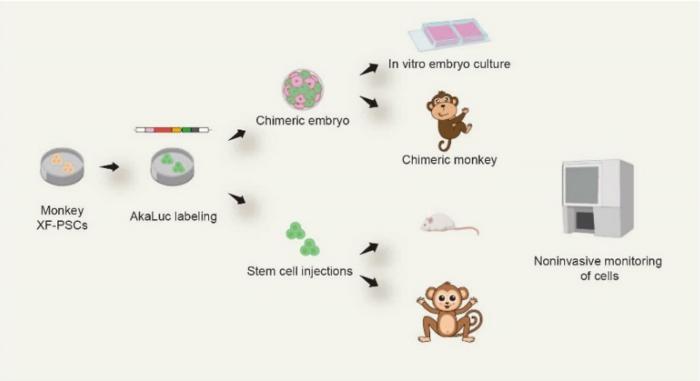Non-human primates (NHPs) have a high degree of similarity to humans compared to other animal models. These similarities manifest at the genetic, physiological, socio-behavioral, and central nervous system levels, making NHPs uniquely suitable for research into stem cell therapy and increasingly used in preclinical trials to test the safety and efficacy of biotechnology therapies. Nonetheless, given the ethical issues and costs associated with this model, it would be highly advantageous to use NHP cellular models in clinical studies. However, developing and maintaining the naïve state of primate pluripotent stem cells (PSCs) remains difficult as does in vivo detection of PSCs, thus limiting biotechnology application in the cynomolgus monkey.

Credit: Junmo Wu, Yu Kang, Xiang Luo, Shaoxing Dai, Yuxi Shi, Zhuoyao Li, Zengli Tang, Zhenzhen Chen, Ran Zhu, Pengpeng Yang, Zifan Li, Hong Wang, Xinglong Chen, Ziyi Zhao, Weizhi Ji, Yuyu Niu
Non-human primates (NHPs) have a high degree of similarity to humans compared to other animal models. These similarities manifest at the genetic, physiological, socio-behavioral, and central nervous system levels, making NHPs uniquely suitable for research into stem cell therapy and increasingly used in preclinical trials to test the safety and efficacy of biotechnology therapies. Nonetheless, given the ethical issues and costs associated with this model, it would be highly advantageous to use NHP cellular models in clinical studies. However, developing and maintaining the naïve state of primate pluripotent stem cells (PSCs) remains difficult as does in vivo detection of PSCs, thus limiting biotechnology application in the cynomolgus monkey.
Recently, researchers from Niu Yuyu’s group reported a chemically defined, xeno-free culture system for culturing and deriving monkey PSCs in vitro. The cells display global gene expression and genome-wide hypomethylation patterns distinct from monkey-primed cells. These xeno-free PSCs can be derived from blastocysts, converted from established PSC lines, or generated by somatic cell reprogramming. It was shown that expression of signaling pathways components may increase the potential for chimera formation. Crucially for biomedical applications, it was also able to integrate bioluminescent reporter genes into monkey PSCs and track them in chimeric embryos in vivo and in vitro (Figure 1). The engineered cells retained embryonic and extra-embryonic developmental potential, capable of differentiating into all three germ layers as well as into reproductive germ-like cells, both in vitro and in vivo. Meanwhile, by integrating AkaLuc, a bioengineered luciferase gene, into the genome of monkey stem cells, a chimeric monkey carrying bioluminescent cells, which were able to track chimeric cells for more than 2 years in living animals, was successfully created. Thus, it is allowed to track the proliferation and migration of chimeric cells within the monkey in vivo.
This result lays the foundation for future research on primate organoids and xenotransplantation. At the same time, the chimerism test will not only verify the pluripotency of stem cells but also help to verify the feasibility of organ compensation in NHPs in the future. The study could have broad utility in primate stem cell engineering and in utilizing chimeric monkey models for clinical studies.
Journal
Protein & Cell
DOI
10.1093/procel/pwad049
Method of Research
Experimental study
Subject of Research
Animal tissue samples
Article Title
Long-term in vivo chimeric cells tracking in non-human primate
Article Publication Date
27-Sep-2023




